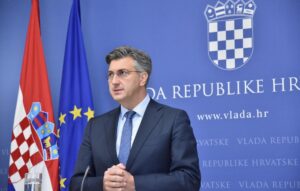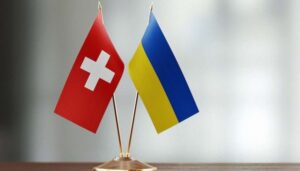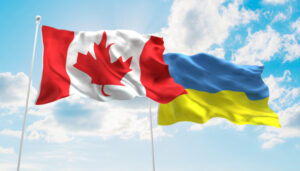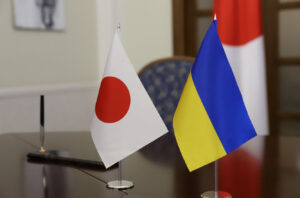
Speaking at the Dubrovnik Forum on Saturday, Croatian Prime Minister Andrej Plenković assured of continued support for Ukraine and recalled the assistance already provided to Kyiv in various areas.
In his speech, Plenković pointed to the negative consequences for Europe and the world of the Covid-19 pandemic, “prolonged by Russian aggression against Ukraine, which has devalued the importance of international law and fundamental principles.”
“On behalf of the Croatian government, I would like to once again express my support for Ukraine, the Ukrainian people, the President, the entire government and thank Minister Kuleba for coming to Dubrovnik today,” the Croatian prime minister said.
He emphasized that there is unity in support of Ukraine among a huge number of countries. Thus, Plenković recalled the recent Global Peace Summit in Switzerland, where, as he noted, about a hundred international organizations and countries were represented, supporting the project of finding a peaceful solution to the consequences of Russian aggression against Ukraine, rather than a solution that would reward the aggressor and thus send a negative signal to other potential aggressors.
“Croatia is helping Ukraine in the political, diplomatic, technical, humanitarian, economic and military spheres, and we will continue to provide all forms of support. Especially given our specific interests in the investigation of war crimes, in humanitarian demining, which we have been facing for 30 years and which we will complete only in March 2026,” Plenković emphasized.

The Swiss government has allocated CHF 58.7 million (EUR 60.6 million at the NBU exchange rate – IF-U) to continue supporting Ukraine in the field of digitalization and e-government over the next four years.
The decision was made by the Federal Council at a meeting on June 7, the Swiss government’s press service reports.
“Thus, Switzerland promotes democratic reforms in Ukraine through digitalization and at the same time increases the transparency of public services. Both areas are crucial for Ukraine’s recovery,” the statement said.
Switzerland will provide a total of 58.7 million Swiss francs in the period 2024-2028. The funding will come from the regular budget for international cooperation and will focus in particular on projects in regions directly affected by the war and important for the country’s future recovery. Some of the key areas will include health, education, and humanitarian demining.
It is noted that Switzerland will announce its support in the field of digitalization and e-government at the next Ukraine Recovery Conference, which will be held on June 11 and 12, 2024 in Berlin.

In 2023, Metinvest Group’s Central, Ingulets and Northern Mining and Processing Plants (GOKs) implemented investment projects aimed at ensuring the stability of production processes and overhauling machinery and equipment, using a total of UAH 2.3 billion.
According to the company’s press release, last year, Metinvest’s Kryvyi Rih mining enterprises invested in projects to improve productivity, product quality, ensure the smooth operation of key equipment, and reduce the cost of producing iron ore.
The main projects implemented last year at Pivdennyi GOK included the modernization of sections and the installation of a new economical engine on the 2TE10M diesel locomotive, which is used to transport ore from the Pervomaisky open pit to the first crushing plant. It also includes the installation of roller screens for raw pellets at the LURGI-552A roasting machine to maintain competitive positions in the European iron ore market.
To ensure that the concentrate moisture content is met, a new vacuum filter was installed at Ore Dressing Plant No. 1 and a vacuum pump was replaced at Ore Dressing Plant No. 2.
Last year, Central GOK completed an important energy efficiency project. Pumping equipment was replaced at the facilities of the sludge management and technical power supply shops to reduce electricity costs. The company also launched a project to build a complex of treatment equipment to provide the plant’s facilities with drinking water.
The report emphasizes that even in the midst of the war, the program to improve working conditions at the plant continues. Repairs were carried out in the canteens of the Petrovsky open pit, crushing and concentrating plants. The crusher’s administrative and amenity building had its showers overhauled.
Last year, the bulk of capital investments at Ingulets Mining and Processing Plant were directed to projects to maintain production capacity, namely the reconstruction of the tailings dump. To ensure the smooth operation of the technological chain for the extraction and production of concentrate, the plant is preparing additional tanks for storing production residues.
Another major project of the year, which will ensure the development of mining operations at InGOK, concerned the rebuilding of railway tracks at the open pit horizons and the extension of the open pit and dump railroad dead ends.
A significant portion of the GOK’s investments was directed to overhauling machinery and equipment. To ensure uninterrupted mining and transportation of rock mass, the enterprises repaired dump trucks, bulldozers, dump trucks, motor-wheel sets, railway tracks and switches. Crushing and processing plants overhauled sections, crushers, dredgers, grab cranes, floors and fencing structures.
To maintain pellet production at the required level, the roasting machines LURGI 552 A and LURGI 552 B at Northern GOK and OK-324 at the pelletizing plant of Central GOK were shut down for repairs. At the same time, the companies implemented a number of projects to save energy, organize a safe working environment, maintain infrastructure facilities, etc.
“In total, in 2023, Kryvyi Rih GOKs utilized a total of UAH 2.3 billion in investments to maintain production capacity. During the war in 2022-2023, Metinvest Group was recognized by Forbes Ukraine as one of the largest Ukrainian investors. The company’s capital investments during that time amounted to UAH 22.7 billion. Currently, Metinvest’s investment strategy is focused on maintaining the operability of its assets,” the press release states.
As reported earlier, Metinvest is implementing a new model for its Kryvyi Rih mining operations by uniting its mining and processing plants in Kryvyi Rih under a single management.
“Given the current challenges, with no objective way to bring the workload of the GOKs to the optimal level, we are looking for the effect of combining their capabilities and business processes. To this end, the company sees its GOKs not as separate facilities with separate teams, but as one large production site and one large team, and tries to use the advantages of each GOK in a single technological chain. The creation of a single administrative and management center, so to speak, a consolidated GOK, will significantly simplify, speed up and increase the efficiency of these processes, as well as contribute to the creation of new synergies between the enterprises,” explained Yuriy Ryzhenkov, CEO of Metinvest, earlier.
“Metinvest comprises mining and metallurgical enterprises located in Ukraine, Europe and the United States. Its major shareholders are SCM Group (71.24%) and Smart Holding (23.76%), which jointly manage it.
Metinvest Holding LLC is the management company of Metinvest Group.

At a meeting on Friday, the government approved a procedure for providing compensation for the cost of engineering and transport infrastructure built by an applicant/investor with significant investments and the costs of connection and connection to engineering and transport networks necessary for project implementation.
“…approved the last regulatory document necessary to launch the mechanism of state support for projects with significant investments. Investors who are ready to implement projects in Ukraine worth EUR 12 million or more will receive maximum assistance and support from us in the form of support, tax and customs benefits, compensation for the cost of constructed engineering and transport infrastructure facilities or connection to engineering and transport networks, etc.”, the release of the Ministry of Economy quotes First Deputy Prime Minister and Minister of Economy Yulia Svyrydenko.
She added that this year the state budget has allocated UAH 3 billion to support such investors.
The Ministry of Economy clarified that investors who plan to implement a project in Ukraine worth EUR 12 million or more with a duration of up to 5 years in the areas of processing industry, mining for further processing or enrichment, transport, logistics, education, research, healthcare, waste management, art, culture, tourism, sports, and electronic communications will be able to receive state support.
To receive support, the applicant (a resident or non-resident legal entity) must submit an application to the Ministry of Economy together with the relevant documents for the evaluation of a project with significant investments, after which the Ministry must evaluate the investment project and provide an opinion on the feasibility/inefficiency of its implementation and the conclusion of a special investment agreement or refusal to conclude it.
After that, a special investment agreement will be concluded between the Cabinet of Ministers, a local government body (if state support is provided by such a body for the implementation of a project with significant investments), an investor with significant investments, and the applicant.
In addition, to support the preparation and implementation of an investment project with significant investments, the applicant must contact UkraineInvest for information and advisory assistance.
The Ministry of Economy emphasized that investors can receive several types of support from the state, which amount to up to 30% of the amount of an investment project with significant investments, in particular: the preemptive right to use state or communal land plots, compensation for the cost of building engineering and transport infrastructure and the cost of connecting to engineering and transport networks, tax benefits, duty-free import of necessary equipment, as well as exemption from compensation for forestry losses and other costs.
According to the report, projects should include the construction, modernization, technical or technological re-equipment of the relevant investment objects and the creation of new jobs. The investor needs to create at least 10 jobs with a salary at least 50% higher than the average salary in the region for this type of activity, or 30 jobs with a salary at least 30% higher than the average salary in the region for this type of activity, or 50 jobs with a salary at least 15% higher than the average salary in the region for the same type of activity.

Canada will provide expert support on social and economic recovery to 19 Ukrainian communities under the Community-Led Inclusive Recovery (CLIR) initiative, the press service of the Ministry of Community Development, Territories and Infrastructure said.
“The assistance of the CLIR initiative will allow communities to better understand the priorities of recovery, get the necessary knowledge and tools to develop effective inclusive recovery projects taking into account the needs of all groups of residents,” the press release quoted Deputy Prime Minister for Recovery – Minister of Community Development, Territories and Infrastructure Oleksandr Kubrakov as saying.
Communities in Kyiv region (Baryshevka, Glevakha, Boyarka, Velyka Dymyrka), as well as in Dnipropetrovsk region (Sofiyivska, Pershotravenska, Apostolivska, Zelenodolska) have been selected to participate in the program, Nikolaev (Bashtanka, Berezneguvatoe), Odessa (Shabovka, Belgorod-Dnestrovska), Chernigov (Kholmska, Korpska, Menska), Donetsk and Kharkiv (Bliznyukivska, Saventsy, Balakleya) oblasts.
The experts will provide the selected communities with support in strategic management and planning, building partnerships with international organizations and attracting external investments, developing social services, implementing sustainable development principles, and developing recovery plans and strategies.
The CLIR initiative is implemented by the SURGe Project, an international technical assistance project “Supporting Government Reforms in Ukraine” funded by the Government of Canada.
SURGe is a project on inclusive governance in Ukraine, implemented by Alinea International and funded by the Ministry of Foreign Affairs of Canada.

Japan has purchased large-sized equipment for Ukraine with a total capacity of about 200 MW, including 5 gas turbines and 7 large transformers, as part of its support for the energy sector.
The announcement was made during a meeting in Kyiv on Sunday between Ukrainian Energy Minister Herman Galushchenko and Japanese Foreign Minister Yoko Kamikawa. The equipment was purchased and delivered by the Japanese government in cooperation with UNDP and the Japanese International Cooperation Agency Jica.
“This is very important equipment. Some of it is still on the way, but two autotransformers have already been installed, and now we are talking about two more similar ones, as well as five gas turbine units and seven large transformers. We are talking about decentralization of the power system and an additional 200 MW of capacity,” Galushchenko said at a briefing after the meeting.
According to him, the equipment provided by Japan will be distributed throughout the country.
“This fully coincides with the goals of our national energy strategy aimed at decentralizing the energy sector,” the minister added.
In her speech, Yoko Kamikawa categorically condemned Russia’s ongoing attacks on civilian objects and the population and assured of full support for Ukraine.
“It is very important to support Ukrainians to protect them this winter. The equipment that Ukraine receives from us will benefit about 5 million of its citizens,” she said.